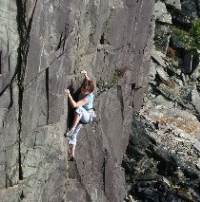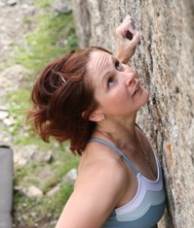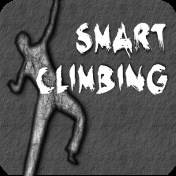PMA, self talk, and how to build your climbing confidence
How many times do we hear ‘ you just need a Positive Mental Attitude (PMA) to get up that route’? It makes intuitive sense doesn’t it and sounds so easy in practice, but what does it actually mean and how do you get a ‘PMA’?

For some people, it seems they have stacks of motivation and nothing gets them down, they embrace failure and use it to propel themselves to greater effort. But for others, self doubt and negative thinking creep in quickly, discouraging and psyche-sapping even the most committed climber.
The good news is that it is possible to change your mental attitude, and its not about standing in front of the mirror every day repeating some affirmation like ‘I am an uber-climber’ or anything like that. Its really a series of small changes and awareness building to move from a state of unconscious self talk (which may or may not be helping you) to more useful and relevant to the task in hand self talk.
To make any change, awareness is the key. For instance, start by thinking about what you say to yourself when you get to a stopper move, don’t complete a climb, or fall off a boulder problem? What emotions do you feel? Are you frustrated and angry, do you find yourself saying ‘I can’t!’ or ‘its impossible!’, or saying ‘I’m going to fall off/ I’ll never do it/ I can’t do overhangs’? A simplistic understanding of self talk would have you say to yourself ‘I can/ I won’t fall off/ I can do overhangs’ – however anyone who has tried this will know this doesn’t often work because its simply not believable enough and your brain smells a rat and conjures up another voice to restate your doubts.
So what to do instead? Start by recognising that:
a. Your thoughts are often not logical, rational or based in fact, but they can create reality if you let them.
b. Critical voices in your head are often based on ‘old’ childhood voices or people who have criticised you in the past and you have internalised them.
c. If you get caught up in that doubtful voice, you will lose focus on what is important, i.e. the physical nature of the climbing.

In this way, you can start to create a little bit of distance between your self, and your thoughts. Developing awareness of how you talk to yourself (and sometimes, who it sounds like!) is the first step in being able to change it.
If you can accept that your thoughts can create reality via a self-fulfilling prophecy, then its possible to see that how you talk to yourself can have an impact on your climbing. Instead perhaps of thinking ‘damn, I fell off again’, then thinking something like ‘falling off is good, it means I am trying hard’ might be more helpful, and even more helpful might be thinking ‘what’s the best way to use that hold that I just fell off’ might be even better. The latter sentence helps you move on from your position of failure to a way of possibly finding success on the next attempt. Talking to yourself as if you were your own best friend (kindly, supportively) is helpful for taking away frustration, and talking to yourself as if you were your own coach with video feedback will help you front-load your next attempt and make success more likely.
Doing this in real time, when you are climbing (rather than in front of the mirror!) and at the end of a climbing session where you try to notice the things (even the tiny things) you did well will build your confidence and your ability to be your own coach and improve your own climbing. To make any change stick, you need to incorporate it into your own current habits and routines. So it might be that you habitually have a drink of water after each problem or route – use this to cue you into checking out your self talk and making sure you are using it wisely. Any change takes a while to master, so talking to your climbing partner about this and agreeing to remind each other to turn negative evaluations into something more useful (note I am saying more useful and not necessarily more positive – relentlessly positive is not useful if its not realistic!) will help you stay on track. Studies have consistently shown that successful athletes are those who manage their self talk and keep it focused on strategies relevant to better practice, rather than beating themselves up or focusing on things they perceive to be ‘impossible’.

Dr Rebecca Williams
Consultant Clinical Psychologist and Climbing Instructor
Smart Climbing
If you would like to learn more about the importance of self talk and how to build your climbing confidence, check out
www.smartclimbing.co.uk for useful tips and advice.
Rebecca is running a
Joint AMI/MTA CPD workshop at the Edinburgh International Climbing arena on Friday 6th June 2014 covering how to coach mental skills for climbing and in particular, how to recognise and address causes of anxiety in climbers. A great workshop to support the Coaching Scheme and Climbing Awards. For more information contact
info@smartclimbing.co.uk